Pros and Cons of Using Financial Rewards to Motivate Employees
VerifiedAdded on 2023/01/19
|8
|2323
|27
AI Summary
This research essay discusses the pros and cons of using financial rewards to motivate employees and enhance employment relationships. It explores the impact of monetary incentives on employee motivation and organizational performance, considering various organizational behavior theories. The essay recommends a balanced approach that considers both monetary and non-monetary rewards.
Contribute Materials
Your contribution can guide someone’s learning journey. Share your
documents today.
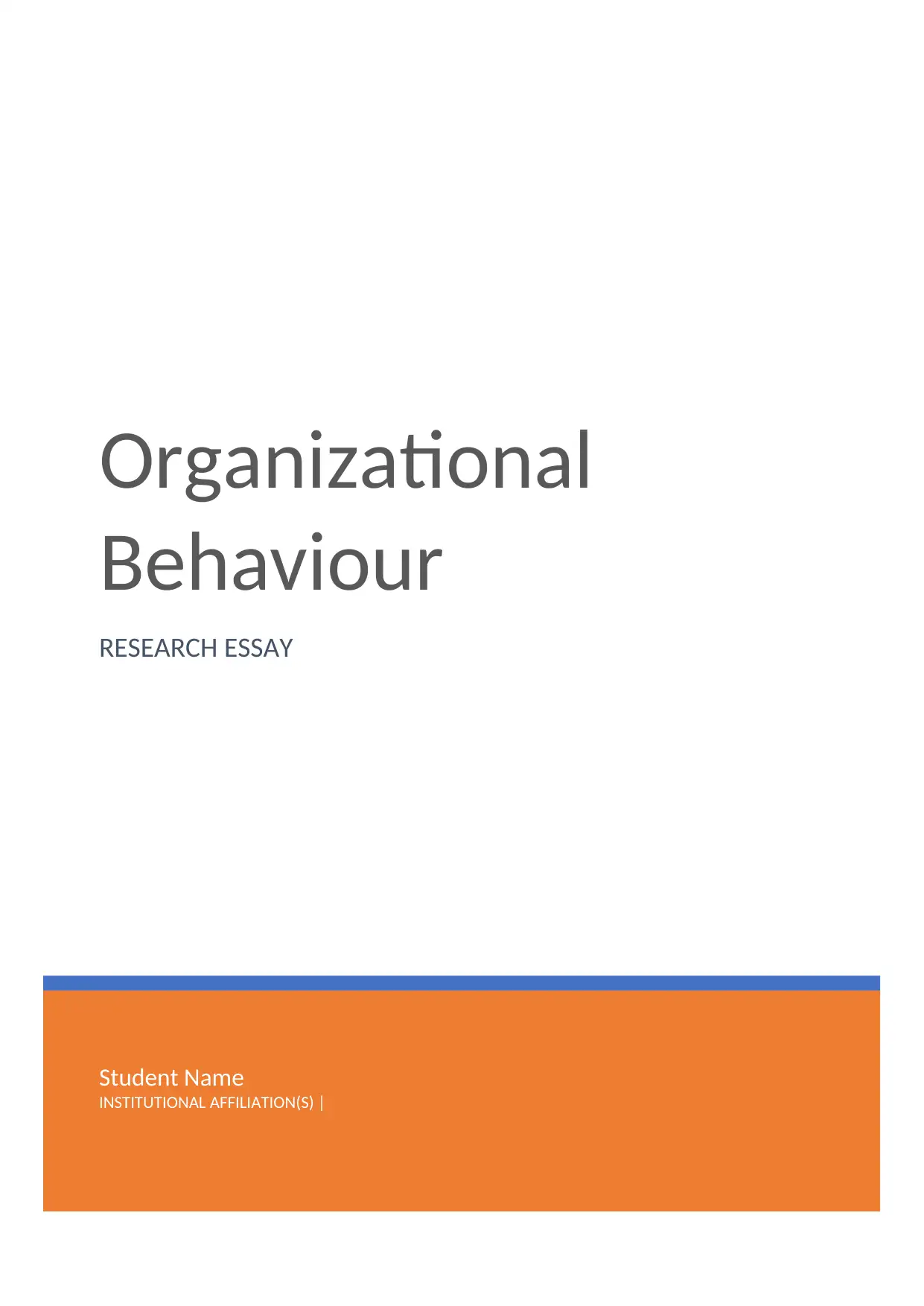
Student Name
INSTITUTIONAL AFFILIATION(S) |
Organizational
Behaviour
RESEARCH ESSAY
INSTITUTIONAL AFFILIATION(S) |
Organizational
Behaviour
RESEARCH ESSAY
Secure Best Marks with AI Grader
Need help grading? Try our AI Grader for instant feedback on your assignments.
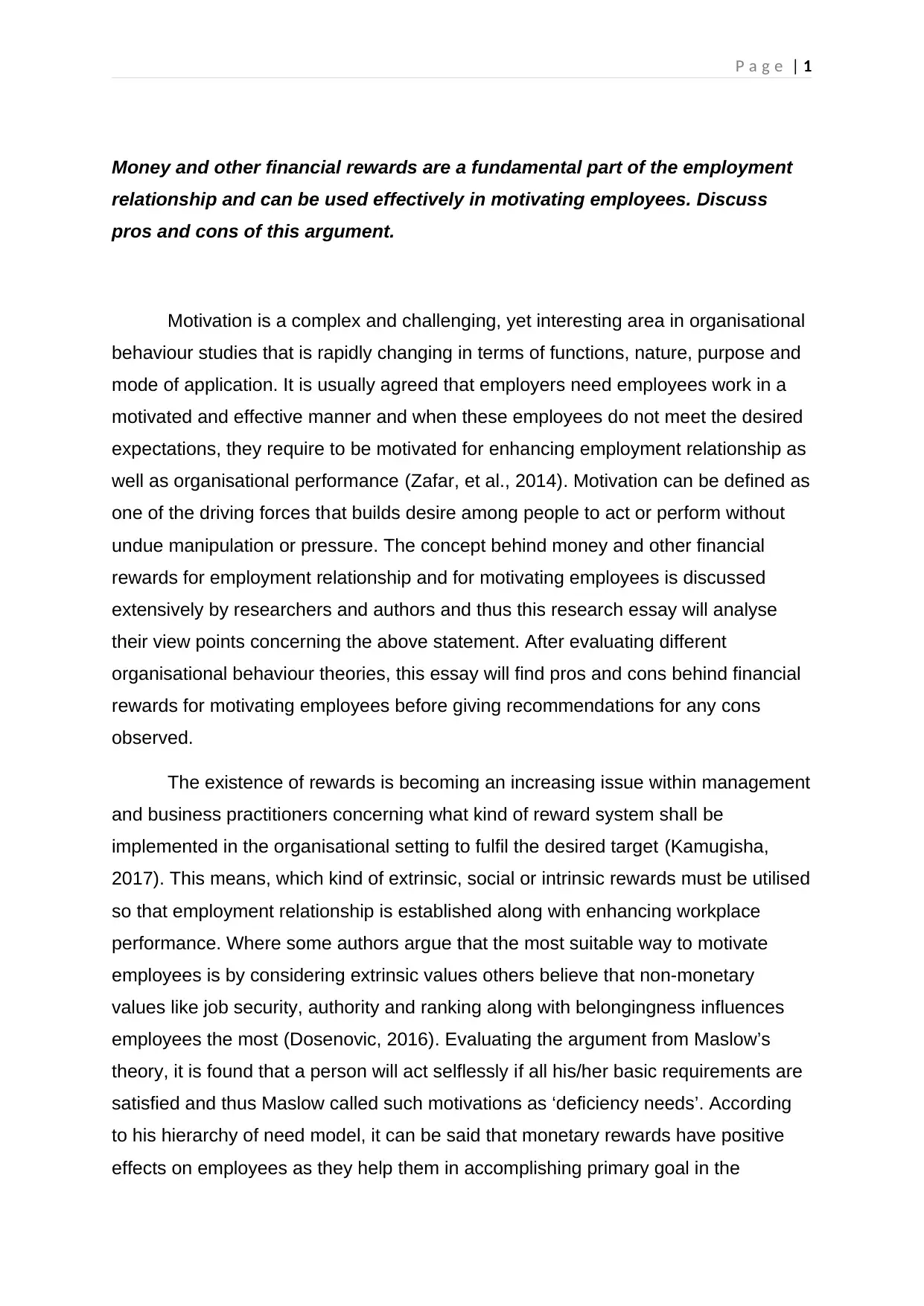
P a g e | 1
Money and other financial rewards are a fundamental part of the employment
relationship and can be used effectively in motivating employees. Discuss
pros and cons of this argument.
Motivation is a complex and challenging, yet interesting area in organisational
behaviour studies that is rapidly changing in terms of functions, nature, purpose and
mode of application. It is usually agreed that employers need employees work in a
motivated and effective manner and when these employees do not meet the desired
expectations, they require to be motivated for enhancing employment relationship as
well as organisational performance (Zafar, et al., 2014). Motivation can be defined as
one of the driving forces that builds desire among people to act or perform without
undue manipulation or pressure. The concept behind money and other financial
rewards for employment relationship and for motivating employees is discussed
extensively by researchers and authors and thus this research essay will analyse
their view points concerning the above statement. After evaluating different
organisational behaviour theories, this essay will find pros and cons behind financial
rewards for motivating employees before giving recommendations for any cons
observed.
The existence of rewards is becoming an increasing issue within management
and business practitioners concerning what kind of reward system shall be
implemented in the organisational setting to fulfil the desired target (Kamugisha,
2017). This means, which kind of extrinsic, social or intrinsic rewards must be utilised
so that employment relationship is established along with enhancing workplace
performance. Where some authors argue that the most suitable way to motivate
employees is by considering extrinsic values others believe that non-monetary
values like job security, authority and ranking along with belongingness influences
employees the most (Dosenovic, 2016). Evaluating the argument from Maslow’s
theory, it is found that a person will act selflessly if all his/her basic requirements are
satisfied and thus Maslow called such motivations as ‘deficiency needs’. According
to his hierarchy of need model, it can be said that monetary rewards have positive
effects on employees as they help them in accomplishing primary goal in the
Money and other financial rewards are a fundamental part of the employment
relationship and can be used effectively in motivating employees. Discuss
pros and cons of this argument.
Motivation is a complex and challenging, yet interesting area in organisational
behaviour studies that is rapidly changing in terms of functions, nature, purpose and
mode of application. It is usually agreed that employers need employees work in a
motivated and effective manner and when these employees do not meet the desired
expectations, they require to be motivated for enhancing employment relationship as
well as organisational performance (Zafar, et al., 2014). Motivation can be defined as
one of the driving forces that builds desire among people to act or perform without
undue manipulation or pressure. The concept behind money and other financial
rewards for employment relationship and for motivating employees is discussed
extensively by researchers and authors and thus this research essay will analyse
their view points concerning the above statement. After evaluating different
organisational behaviour theories, this essay will find pros and cons behind financial
rewards for motivating employees before giving recommendations for any cons
observed.
The existence of rewards is becoming an increasing issue within management
and business practitioners concerning what kind of reward system shall be
implemented in the organisational setting to fulfil the desired target (Kamugisha,
2017). This means, which kind of extrinsic, social or intrinsic rewards must be utilised
so that employment relationship is established along with enhancing workplace
performance. Where some authors argue that the most suitable way to motivate
employees is by considering extrinsic values others believe that non-monetary
values like job security, authority and ranking along with belongingness influences
employees the most (Dosenovic, 2016). Evaluating the argument from Maslow’s
theory, it is found that a person will act selflessly if all his/her basic requirements are
satisfied and thus Maslow called such motivations as ‘deficiency needs’. According
to his hierarchy of need model, it can be said that monetary rewards have positive
effects on employees as they help them in accomplishing primary goal in the
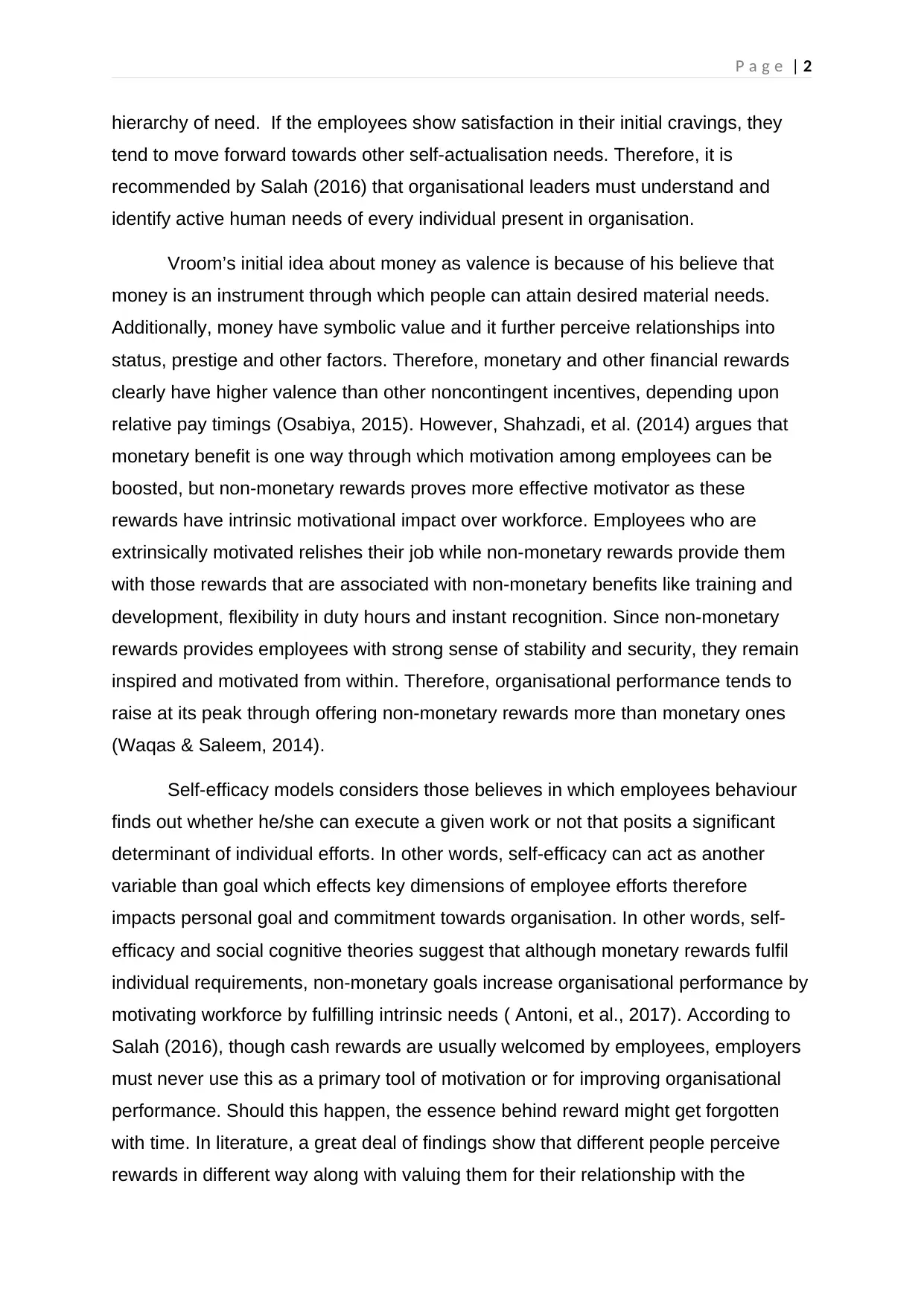
P a g e | 2
hierarchy of need. If the employees show satisfaction in their initial cravings, they
tend to move forward towards other self-actualisation needs. Therefore, it is
recommended by Salah (2016) that organisational leaders must understand and
identify active human needs of every individual present in organisation.
Vroom’s initial idea about money as valence is because of his believe that
money is an instrument through which people can attain desired material needs.
Additionally, money have symbolic value and it further perceive relationships into
status, prestige and other factors. Therefore, monetary and other financial rewards
clearly have higher valence than other noncontingent incentives, depending upon
relative pay timings (Osabiya, 2015). However, Shahzadi, et al. (2014) argues that
monetary benefit is one way through which motivation among employees can be
boosted, but non-monetary rewards proves more effective motivator as these
rewards have intrinsic motivational impact over workforce. Employees who are
extrinsically motivated relishes their job while non-monetary rewards provide them
with those rewards that are associated with non-monetary benefits like training and
development, flexibility in duty hours and instant recognition. Since non-monetary
rewards provides employees with strong sense of stability and security, they remain
inspired and motivated from within. Therefore, organisational performance tends to
raise at its peak through offering non-monetary rewards more than monetary ones
(Waqas & Saleem, 2014).
Self-efficacy models considers those believes in which employees behaviour
finds out whether he/she can execute a given work or not that posits a significant
determinant of individual efforts. In other words, self-efficacy can act as another
variable than goal which effects key dimensions of employee efforts therefore
impacts personal goal and commitment towards organisation. In other words, self-
efficacy and social cognitive theories suggest that although monetary rewards fulfil
individual requirements, non-monetary goals increase organisational performance by
motivating workforce by fulfilling intrinsic needs ( Antoni, et al., 2017). According to
Salah (2016), though cash rewards are usually welcomed by employees, employers
must never use this as a primary tool of motivation or for improving organisational
performance. Should this happen, the essence behind reward might get forgotten
with time. In literature, a great deal of findings show that different people perceive
rewards in different way along with valuing them for their relationship with the
hierarchy of need. If the employees show satisfaction in their initial cravings, they
tend to move forward towards other self-actualisation needs. Therefore, it is
recommended by Salah (2016) that organisational leaders must understand and
identify active human needs of every individual present in organisation.
Vroom’s initial idea about money as valence is because of his believe that
money is an instrument through which people can attain desired material needs.
Additionally, money have symbolic value and it further perceive relationships into
status, prestige and other factors. Therefore, monetary and other financial rewards
clearly have higher valence than other noncontingent incentives, depending upon
relative pay timings (Osabiya, 2015). However, Shahzadi, et al. (2014) argues that
monetary benefit is one way through which motivation among employees can be
boosted, but non-monetary rewards proves more effective motivator as these
rewards have intrinsic motivational impact over workforce. Employees who are
extrinsically motivated relishes their job while non-monetary rewards provide them
with those rewards that are associated with non-monetary benefits like training and
development, flexibility in duty hours and instant recognition. Since non-monetary
rewards provides employees with strong sense of stability and security, they remain
inspired and motivated from within. Therefore, organisational performance tends to
raise at its peak through offering non-monetary rewards more than monetary ones
(Waqas & Saleem, 2014).
Self-efficacy models considers those believes in which employees behaviour
finds out whether he/she can execute a given work or not that posits a significant
determinant of individual efforts. In other words, self-efficacy can act as another
variable than goal which effects key dimensions of employee efforts therefore
impacts personal goal and commitment towards organisation. In other words, self-
efficacy and social cognitive theories suggest that although monetary rewards fulfil
individual requirements, non-monetary goals increase organisational performance by
motivating workforce by fulfilling intrinsic needs ( Antoni, et al., 2017). According to
Salah (2016), though cash rewards are usually welcomed by employees, employers
must never use this as a primary tool of motivation or for improving organisational
performance. Should this happen, the essence behind reward might get forgotten
with time. In literature, a great deal of findings show that different people perceive
rewards in different way along with valuing them for their relationship with the
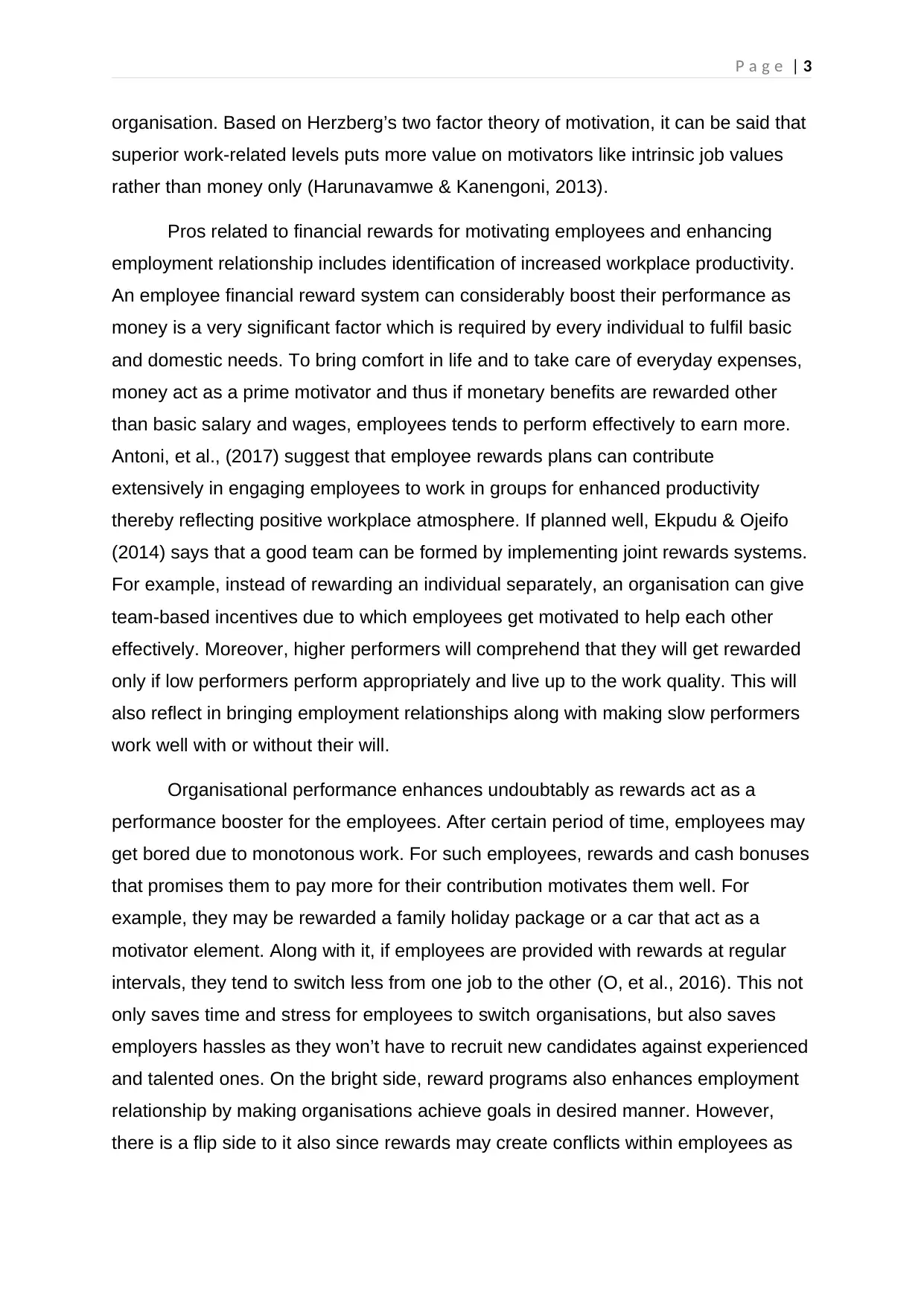
P a g e | 3
organisation. Based on Herzberg’s two factor theory of motivation, it can be said that
superior work-related levels puts more value on motivators like intrinsic job values
rather than money only (Harunavamwe & Kanengoni, 2013).
Pros related to financial rewards for motivating employees and enhancing
employment relationship includes identification of increased workplace productivity.
An employee financial reward system can considerably boost their performance as
money is a very significant factor which is required by every individual to fulfil basic
and domestic needs. To bring comfort in life and to take care of everyday expenses,
money act as a prime motivator and thus if monetary benefits are rewarded other
than basic salary and wages, employees tends to perform effectively to earn more.
Antoni, et al., (2017) suggest that employee rewards plans can contribute
extensively in engaging employees to work in groups for enhanced productivity
thereby reflecting positive workplace atmosphere. If planned well, Ekpudu & Ojeifo
(2014) says that a good team can be formed by implementing joint rewards systems.
For example, instead of rewarding an individual separately, an organisation can give
team-based incentives due to which employees get motivated to help each other
effectively. Moreover, higher performers will comprehend that they will get rewarded
only if low performers perform appropriately and live up to the work quality. This will
also reflect in bringing employment relationships along with making slow performers
work well with or without their will.
Organisational performance enhances undoubtably as rewards act as a
performance booster for the employees. After certain period of time, employees may
get bored due to monotonous work. For such employees, rewards and cash bonuses
that promises them to pay more for their contribution motivates them well. For
example, they may be rewarded a family holiday package or a car that act as a
motivator element. Along with it, if employees are provided with rewards at regular
intervals, they tend to switch less from one job to the other (O, et al., 2016). This not
only saves time and stress for employees to switch organisations, but also saves
employers hassles as they won’t have to recruit new candidates against experienced
and talented ones. On the bright side, reward programs also enhances employment
relationship by making organisations achieve goals in desired manner. However,
there is a flip side to it also since rewards may create conflicts within employees as
organisation. Based on Herzberg’s two factor theory of motivation, it can be said that
superior work-related levels puts more value on motivators like intrinsic job values
rather than money only (Harunavamwe & Kanengoni, 2013).
Pros related to financial rewards for motivating employees and enhancing
employment relationship includes identification of increased workplace productivity.
An employee financial reward system can considerably boost their performance as
money is a very significant factor which is required by every individual to fulfil basic
and domestic needs. To bring comfort in life and to take care of everyday expenses,
money act as a prime motivator and thus if monetary benefits are rewarded other
than basic salary and wages, employees tends to perform effectively to earn more.
Antoni, et al., (2017) suggest that employee rewards plans can contribute
extensively in engaging employees to work in groups for enhanced productivity
thereby reflecting positive workplace atmosphere. If planned well, Ekpudu & Ojeifo
(2014) says that a good team can be formed by implementing joint rewards systems.
For example, instead of rewarding an individual separately, an organisation can give
team-based incentives due to which employees get motivated to help each other
effectively. Moreover, higher performers will comprehend that they will get rewarded
only if low performers perform appropriately and live up to the work quality. This will
also reflect in bringing employment relationships along with making slow performers
work well with or without their will.
Organisational performance enhances undoubtably as rewards act as a
performance booster for the employees. After certain period of time, employees may
get bored due to monotonous work. For such employees, rewards and cash bonuses
that promises them to pay more for their contribution motivates them well. For
example, they may be rewarded a family holiday package or a car that act as a
motivator element. Along with it, if employees are provided with rewards at regular
intervals, they tend to switch less from one job to the other (O, et al., 2016). This not
only saves time and stress for employees to switch organisations, but also saves
employers hassles as they won’t have to recruit new candidates against experienced
and talented ones. On the bright side, reward programs also enhances employment
relationship by making organisations achieve goals in desired manner. However,
there is a flip side to it also since rewards may create conflicts within employees as
Secure Best Marks with AI Grader
Need help grading? Try our AI Grader for instant feedback on your assignments.
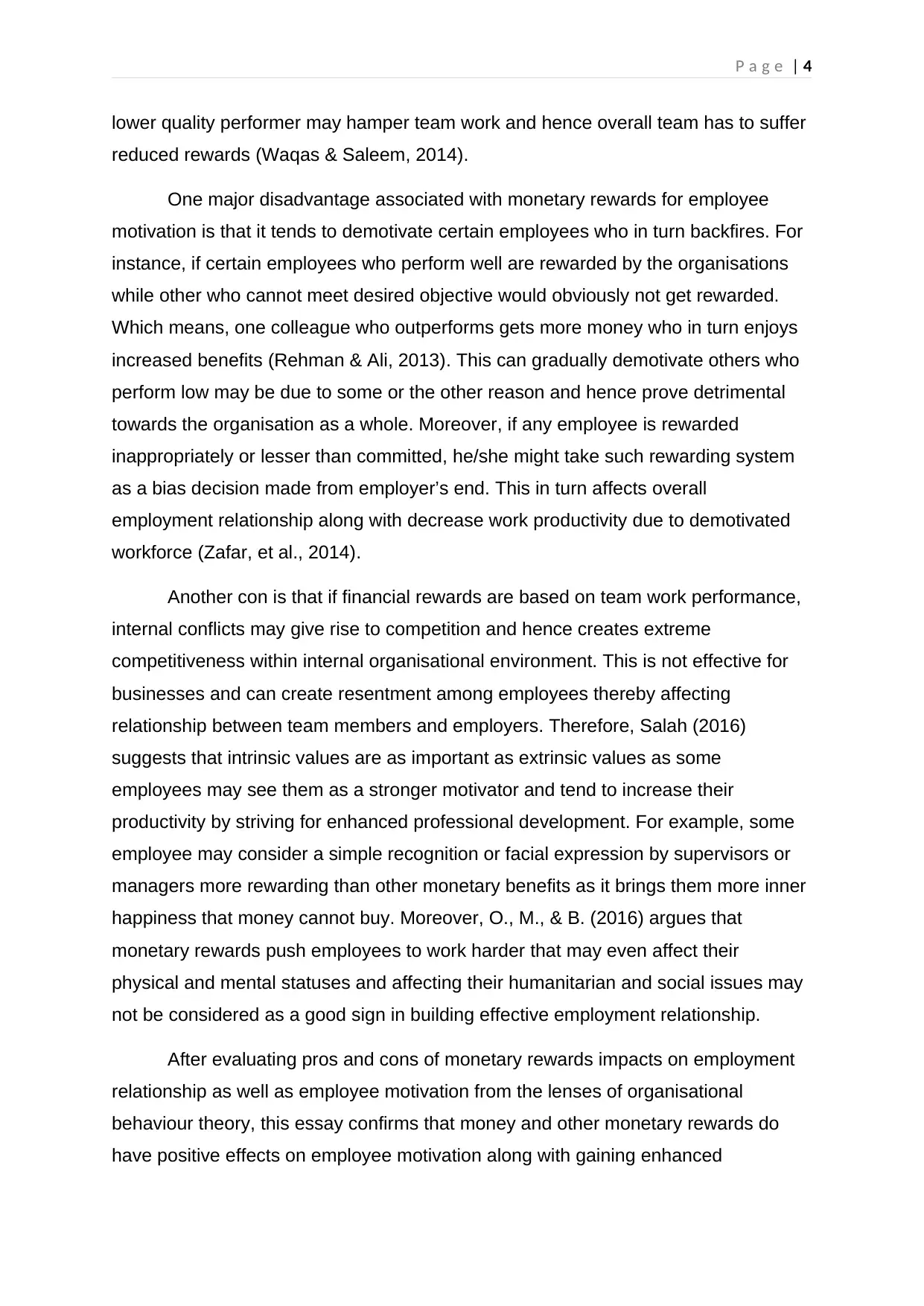
P a g e | 4
lower quality performer may hamper team work and hence overall team has to suffer
reduced rewards (Waqas & Saleem, 2014).
One major disadvantage associated with monetary rewards for employee
motivation is that it tends to demotivate certain employees who in turn backfires. For
instance, if certain employees who perform well are rewarded by the organisations
while other who cannot meet desired objective would obviously not get rewarded.
Which means, one colleague who outperforms gets more money who in turn enjoys
increased benefits (Rehman & Ali, 2013). This can gradually demotivate others who
perform low may be due to some or the other reason and hence prove detrimental
towards the organisation as a whole. Moreover, if any employee is rewarded
inappropriately or lesser than committed, he/she might take such rewarding system
as a bias decision made from employer’s end. This in turn affects overall
employment relationship along with decrease work productivity due to demotivated
workforce (Zafar, et al., 2014).
Another con is that if financial rewards are based on team work performance,
internal conflicts may give rise to competition and hence creates extreme
competitiveness within internal organisational environment. This is not effective for
businesses and can create resentment among employees thereby affecting
relationship between team members and employers. Therefore, Salah (2016)
suggests that intrinsic values are as important as extrinsic values as some
employees may see them as a stronger motivator and tend to increase their
productivity by striving for enhanced professional development. For example, some
employee may consider a simple recognition or facial expression by supervisors or
managers more rewarding than other monetary benefits as it brings them more inner
happiness that money cannot buy. Moreover, O., M., & B. (2016) argues that
monetary rewards push employees to work harder that may even affect their
physical and mental statuses and affecting their humanitarian and social issues may
not be considered as a good sign in building effective employment relationship.
After evaluating pros and cons of monetary rewards impacts on employment
relationship as well as employee motivation from the lenses of organisational
behaviour theory, this essay confirms that money and other monetary rewards do
have positive effects on employee motivation along with gaining enhanced
lower quality performer may hamper team work and hence overall team has to suffer
reduced rewards (Waqas & Saleem, 2014).
One major disadvantage associated with monetary rewards for employee
motivation is that it tends to demotivate certain employees who in turn backfires. For
instance, if certain employees who perform well are rewarded by the organisations
while other who cannot meet desired objective would obviously not get rewarded.
Which means, one colleague who outperforms gets more money who in turn enjoys
increased benefits (Rehman & Ali, 2013). This can gradually demotivate others who
perform low may be due to some or the other reason and hence prove detrimental
towards the organisation as a whole. Moreover, if any employee is rewarded
inappropriately or lesser than committed, he/she might take such rewarding system
as a bias decision made from employer’s end. This in turn affects overall
employment relationship along with decrease work productivity due to demotivated
workforce (Zafar, et al., 2014).
Another con is that if financial rewards are based on team work performance,
internal conflicts may give rise to competition and hence creates extreme
competitiveness within internal organisational environment. This is not effective for
businesses and can create resentment among employees thereby affecting
relationship between team members and employers. Therefore, Salah (2016)
suggests that intrinsic values are as important as extrinsic values as some
employees may see them as a stronger motivator and tend to increase their
productivity by striving for enhanced professional development. For example, some
employee may consider a simple recognition or facial expression by supervisors or
managers more rewarding than other monetary benefits as it brings them more inner
happiness that money cannot buy. Moreover, O., M., & B. (2016) argues that
monetary rewards push employees to work harder that may even affect their
physical and mental statuses and affecting their humanitarian and social issues may
not be considered as a good sign in building effective employment relationship.
After evaluating pros and cons of monetary rewards impacts on employment
relationship as well as employee motivation from the lenses of organisational
behaviour theory, this essay confirms that money and other monetary rewards do
have positive effects on employee motivation along with gaining enhanced
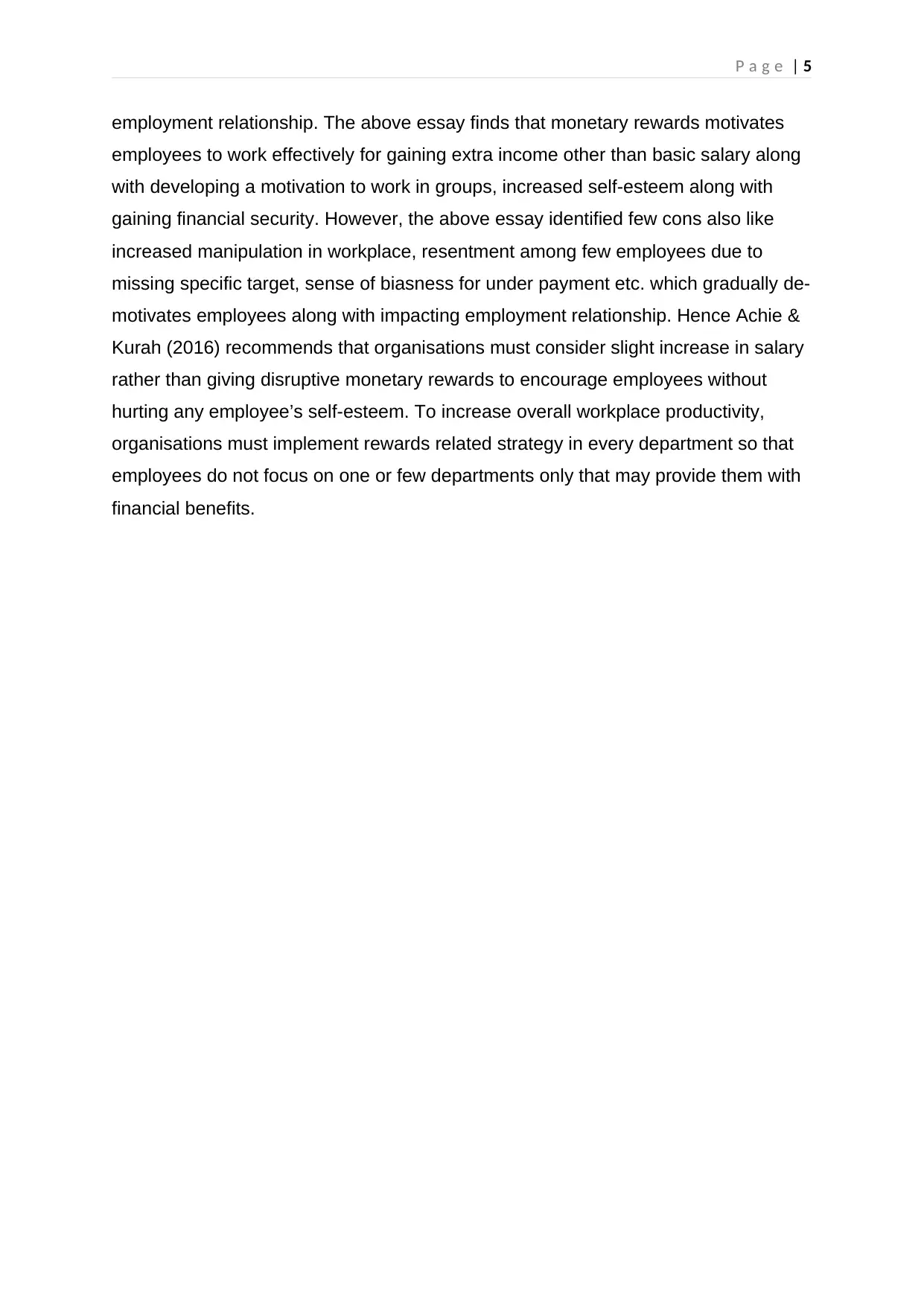
P a g e | 5
employment relationship. The above essay finds that monetary rewards motivates
employees to work effectively for gaining extra income other than basic salary along
with developing a motivation to work in groups, increased self-esteem along with
gaining financial security. However, the above essay identified few cons also like
increased manipulation in workplace, resentment among few employees due to
missing specific target, sense of biasness for under payment etc. which gradually de-
motivates employees along with impacting employment relationship. Hence Achie &
Kurah (2016) recommends that organisations must consider slight increase in salary
rather than giving disruptive monetary rewards to encourage employees without
hurting any employee’s self-esteem. To increase overall workplace productivity,
organisations must implement rewards related strategy in every department so that
employees do not focus on one or few departments only that may provide them with
financial benefits.
employment relationship. The above essay finds that monetary rewards motivates
employees to work effectively for gaining extra income other than basic salary along
with developing a motivation to work in groups, increased self-esteem along with
gaining financial security. However, the above essay identified few cons also like
increased manipulation in workplace, resentment among few employees due to
missing specific target, sense of biasness for under payment etc. which gradually de-
motivates employees along with impacting employment relationship. Hence Achie &
Kurah (2016) recommends that organisations must consider slight increase in salary
rather than giving disruptive monetary rewards to encourage employees without
hurting any employee’s self-esteem. To increase overall workplace productivity,
organisations must implement rewards related strategy in every department so that
employees do not focus on one or few departments only that may provide them with
financial benefits.
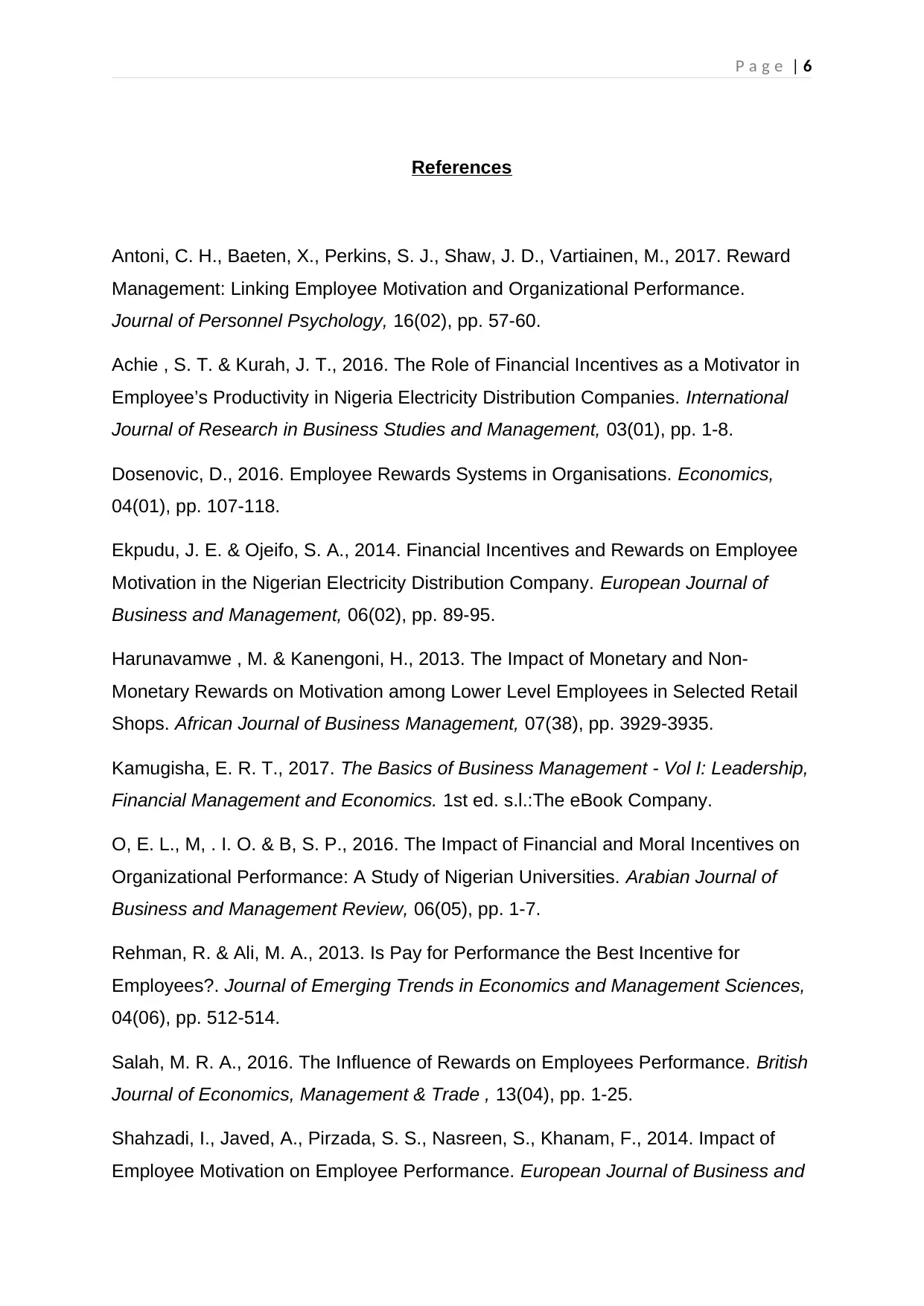
P a g e | 6
References
Antoni, C. H., Baeten, X., Perkins, S. J., Shaw, J. D., Vartiainen, M., 2017. Reward
Management: Linking Employee Motivation and Organizational Performance.
Journal of Personnel Psychology, 16(02), pp. 57-60.
Achie , S. T. & Kurah, J. T., 2016. The Role of Financial Incentives as a Motivator in
Employee’s Productivity in Nigeria Electricity Distribution Companies. International
Journal of Research in Business Studies and Management, 03(01), pp. 1-8.
Dosenovic, D., 2016. Employee Rewards Systems in Organisations. Economics,
04(01), pp. 107-118.
Ekpudu, J. E. & Ojeifo, S. A., 2014. Financial Incentives and Rewards on Employee
Motivation in the Nigerian Electricity Distribution Company. European Journal of
Business and Management, 06(02), pp. 89-95.
Harunavamwe , M. & Kanengoni, H., 2013. The Impact of Monetary and Non-
Monetary Rewards on Motivation among Lower Level Employees in Selected Retail
Shops. African Journal of Business Management, 07(38), pp. 3929-3935.
Kamugisha, E. R. T., 2017. The Basics of Business Management - Vol I: Leadership,
Financial Management and Economics. 1st ed. s.l.:The eBook Company.
O, E. L., M, . I. O. & B, S. P., 2016. The Impact of Financial and Moral Incentives on
Organizational Performance: A Study of Nigerian Universities. Arabian Journal of
Business and Management Review, 06(05), pp. 1-7.
Rehman, R. & Ali, M. A., 2013. Is Pay for Performance the Best Incentive for
Employees?. Journal of Emerging Trends in Economics and Management Sciences,
04(06), pp. 512-514.
Salah, M. R. A., 2016. The Influence of Rewards on Employees Performance. British
Journal of Economics, Management & Trade , 13(04), pp. 1-25.
Shahzadi, I., Javed, A., Pirzada, S. S., Nasreen, S., Khanam, F., 2014. Impact of
Employee Motivation on Employee Performance. European Journal of Business and
References
Antoni, C. H., Baeten, X., Perkins, S. J., Shaw, J. D., Vartiainen, M., 2017. Reward
Management: Linking Employee Motivation and Organizational Performance.
Journal of Personnel Psychology, 16(02), pp. 57-60.
Achie , S. T. & Kurah, J. T., 2016. The Role of Financial Incentives as a Motivator in
Employee’s Productivity in Nigeria Electricity Distribution Companies. International
Journal of Research in Business Studies and Management, 03(01), pp. 1-8.
Dosenovic, D., 2016. Employee Rewards Systems in Organisations. Economics,
04(01), pp. 107-118.
Ekpudu, J. E. & Ojeifo, S. A., 2014. Financial Incentives and Rewards on Employee
Motivation in the Nigerian Electricity Distribution Company. European Journal of
Business and Management, 06(02), pp. 89-95.
Harunavamwe , M. & Kanengoni, H., 2013. The Impact of Monetary and Non-
Monetary Rewards on Motivation among Lower Level Employees in Selected Retail
Shops. African Journal of Business Management, 07(38), pp. 3929-3935.
Kamugisha, E. R. T., 2017. The Basics of Business Management - Vol I: Leadership,
Financial Management and Economics. 1st ed. s.l.:The eBook Company.
O, E. L., M, . I. O. & B, S. P., 2016. The Impact of Financial and Moral Incentives on
Organizational Performance: A Study of Nigerian Universities. Arabian Journal of
Business and Management Review, 06(05), pp. 1-7.
Rehman, R. & Ali, M. A., 2013. Is Pay for Performance the Best Incentive for
Employees?. Journal of Emerging Trends in Economics and Management Sciences,
04(06), pp. 512-514.
Salah, M. R. A., 2016. The Influence of Rewards on Employees Performance. British
Journal of Economics, Management & Trade , 13(04), pp. 1-25.
Shahzadi, I., Javed, A., Pirzada, S. S., Nasreen, S., Khanam, F., 2014. Impact of
Employee Motivation on Employee Performance. European Journal of Business and
Paraphrase This Document
Need a fresh take? Get an instant paraphrase of this document with our AI Paraphraser
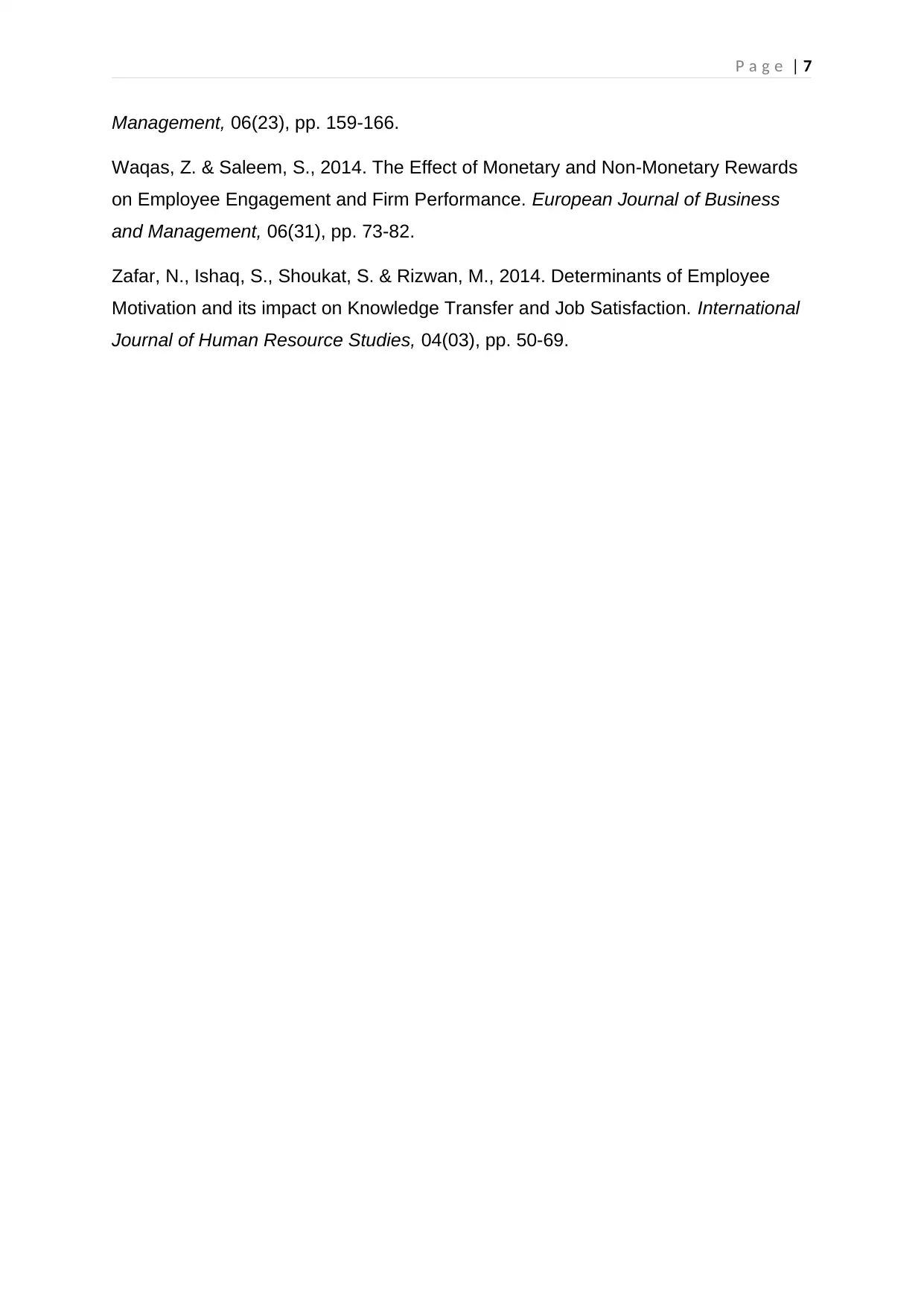
P a g e | 7
Management, 06(23), pp. 159-166.
Waqas, Z. & Saleem, S., 2014. The Effect of Monetary and Non-Monetary Rewards
on Employee Engagement and Firm Performance. European Journal of Business
and Management, 06(31), pp. 73-82.
Zafar, N., Ishaq, S., Shoukat, S. & Rizwan, M., 2014. Determinants of Employee
Motivation and its impact on Knowledge Transfer and Job Satisfaction. International
Journal of Human Resource Studies, 04(03), pp. 50-69.
Management, 06(23), pp. 159-166.
Waqas, Z. & Saleem, S., 2014. The Effect of Monetary and Non-Monetary Rewards
on Employee Engagement and Firm Performance. European Journal of Business
and Management, 06(31), pp. 73-82.
Zafar, N., Ishaq, S., Shoukat, S. & Rizwan, M., 2014. Determinants of Employee
Motivation and its impact on Knowledge Transfer and Job Satisfaction. International
Journal of Human Resource Studies, 04(03), pp. 50-69.
1 out of 8
Related Documents
Your All-in-One AI-Powered Toolkit for Academic Success.
+13062052269
info@desklib.com
Available 24*7 on WhatsApp / Email
![[object Object]](/_next/static/media/star-bottom.7253800d.svg)
Unlock your academic potential
© 2024 | Zucol Services PVT LTD | All rights reserved.





